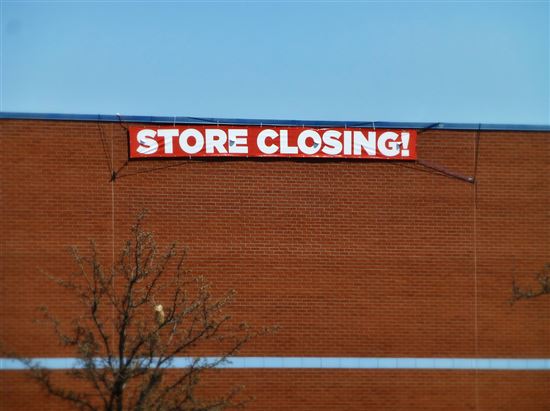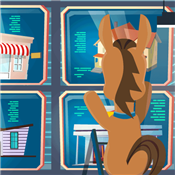23 Common Reasons Why Your Business Might Fail
Nearly half of small businesses fail within 5 years. Understand why so many fail to increase your chances for success. Read on for the 23 most common causes.
 |
| © Nicholas Eckhart (CC BY 2.0) via Flickr |
We always hear about the Facebooks and Apples of this world, but have you ever heard of Everpix? How about Wesabe?
They didn't become household names because they either couldn't get users to sign up at the pace they needed or they failed to compete.
Sometimes the reason a business falters is obvious, but usually the answer is more nuanced, with several factors playing a role and all of them taking a collective hit on the company's ability to keep its customers satisfied and its cash flowing.
Let's get the bad news out of the way first:
The odds seem to be naturally against new businesses. Research shows that 21% of businesses fail within their first year, 52% fail by the fifth year, and only 33% actually endure past year 10.
And now here's the good news:
If about half the businesses fail by year 5, that means half succeeds too. And yours can be one of them.
Understanding the most common causes for failure will help you from making the same mistakes. We've gathered 23 reasons why businesses fail and how you can avoid the same fate.
Related: Startup Failure Rate Statistics
 |
| © Nicholas Eckhart (CC BY 2.0) via Flickr |
1. You don't have clear goals.
Your business needs direction and a sense of purpose.
In the beginning stages of a new company, it's easy for business owners to identify their goals. But when things change or don't go as planned, they can lose their vision.
A survey conducted by The Turnaround Management Society, an organization that promotes best management practices, shows that 51.4% of experts believe that businesses went south because they had lost their vision.
A business needs a strong vision in order to survive and stay competitive. The market is ever changing and you will need to have a clearly defined strategy to adapt to the changes. Business that don't think about the future tend to stick with the status quo - a flaw that can lead to their demise.
2. You have poor management skills.
If you ask any CEO of a failed company why their business went under, they'll probably blame outside factors: the recession, lack of demand, or bad partnerships.
But most of the time the real cause can be pinned down to one simple thing:
Poor management.
It's a hard truth to swallow, but sometimes entrepreneurs just aren't cut out for the nitty-gritty details of business management.
In a survey conducted by the Turnaround Society, more than half of the experts say a company failed because management stubbornly stuck to a strategy that wasn't working. Nearly a third also believes that management tends to underestimate the changes in the market and doesn't adapt appropriately.
A separate study conducted by CCH reveals that 50% of business failures are because of inexperienced management.
How to avoid this: In short, bad managers make bad business decisions. If you doubt your management skills, there are ways to remedy the situation:
Management training, hiring an experienced manager/partner, or finding a mentor can go a long way in gaining perspective and helping you save your company from bad business decisions before a crisis happens.
3. Your business is in a bad location.
Even in the age of the Internet, the location of your business does matter.
Where you choose to hang your hat determines who is in your professional network, the local pool of available talent, the cost of office space, the cost of transport for materials, and your brand visibility, among many other variables. Businesses with a physical store also have to consider the local economy, foot traffic, and their nearby competition.
In a CB Insights study, 9% of businesses blamed a bad location for their failure. Entrepreneurs who are strategic about their business' location have a higher likelihood of hiring the best people and reaching their target market.
4. You have bad customer service.
Aside from having mediocre products, the fastest way to turn off a potential customer is by providing bad customer service.
Good customer service is more complicated than just treating customers nicely. It also includes the efficiency of your business, how you handle customer complaints, how you develop customer relationships, and whether you respond to customers' needs.
A recent CreditDonkey survey about small businesses reveals that 85% of customers would walk away from a purchase because of a bad customer service experience, and 55% of consumers prioritize customer service over convenience.
With customer service being such a valued part of a consumer experience, poor service can greatly contribute to business failure.
Take the Turnaround Society's survey - 9.2% of experts blamed poor customer service for businesses' downfall. Likewise, the CB Insights study shows that 14% of failed businesses stated that their business failed in part because they ignored customers.
How to avoid this: Your ability to meet your customers' needs and provide them with quality service may determine whether your business sinks or swims. Pay attention to their interests and changing needs.
Tip: How to Make Happy Customers
5. You can't stay competitive.
Nobody likes competition, but science suggests that a little bit of healthy competition can keep you on your toes and strengthen your business.
The 'Red Queen' hypothesis, named after an Alice in Wonderland character, asserts that in order for a business to survive, it has to adapt, and that leads to worsening conditions for its competition, forcing the competitor to adapt as well. What results is a cycle of competition and learning, where both businesses improve their product or service in a response to the other.
In a longitudinal study of more than 150 businesses, researchers William Barnett and David McKendrick found that those that endured competition were more likely to survive than businesses that were isolated from competition.
However, the key word is 'endure.' In a study from CB Insights, 19% of startups reported that they failed because they weren't able to beat the competition.
How to avoid this: To use the Red Queen theory to your advantage, know your competition, learn from them, and beat them at their own game.
6. You have a bad business plan (or no business plan at all).
Imagine taking a road trip without a map. Or going to the grocery store without a list. Or building an IKEA cabinet without instructions.
How would you do? You would probably take a lot of wrong turns. Waste a lot of time going down each aisle. And end up with doors that don't close right.
This is why taking the time to make a comprehensive business plan is so important. Not only that, but a detailed business plan is often a requirement for securing funding from investors in the future.
The CB Insights study of startup post-mortems shows that 17% failed because they lacked a business model. The results from a survey of failed small-to-medium-sized enterprises conducted by CCH, an Australian accounting software company, reveals an even higher percentage (50%) of businesses fail because of a poorly designed business plan, or no business plan at all.
Take this example:
The Scottish gaming company RealTime Worlds closed its doors in 2010 after its much-hyped game APB failed to bring in the expected revenue, and many blamed its lack of a business model for its demise.
How to avoid this: Take the time to make a detailed business plan that includes: vision and goals for the business, solutions to potential problems, analysis of the competition, financials such as cash flow and expected growth and expenses, plans for marketing, and plans for future growth and management.
7. You lack passion for what you're selling.
If you're already thinking about owning a business, it's safe to say that you have the ambition that's required to be an entrepreneur.
However, what is the reason you want to start a business?
Is it just because you want to make a ton of money and then never work again, or because you're sick of driving in to work every day and sitting in a cubicle?
Or is it because you truly feel a passion for your product? And is this passion enough have staying power, even when you start to feel the strains of burnout from working so much or stress over your ability to get funding?
Startups face a number of obstacles in their first year, and they need the motivation to keep going. Passion for their product can push them through the obstacles.
9% of businesses surveyed by CB Insights stated that a lack of passion contributed to their business' failure. In the web service Youcastr's post-mortem, CEO Ariel Diaz believed that their lack of passion and interest in their product made it difficult to stay motivated and sustain the same energy level for the 3 years it took to build their company.
How to avoid this: Think about why you want to start a business. Do you truly feel a passion for the product or service you're selling? Your level of passion and commitment will determine whether you persevere or need to pull the plug on your business venture.
8. You have insufficient marketing.
You may have the best product on the market, but guess what?
Customers aren't going to come to you if they don't even know you exist.
Don't expect to just sit back and have people find your awesome product. Get their attention. If you don't have a strong marketing plan, you won't be able to communicate your product's value to potential customers.
In the survey by CCH, 37% of entrepreneurs cited insufficient marketing as the reason why their companies didn't survive. In the CB Insights study, 14% of entrepreneurs also blamed their inability to market as the reason why their startups failed.
Having a superior product isn't enough to be successful in the business world. Entrepreneurs need to be able to promote their products so that they keep the loyalty of old customers and gain a steady stream of new ones.
9. You can't adapt to the market.
Public demand can be fickle, and many business owners have learned the hard way that they have to be flexible in order to survive.
The most successful businesses are those that are able to adapt to their customers' needs, regardless of whether it fits in with their original vision. In the Turnaround Society's 2014 survey, 51.6% of managers and experts stated that businesses fail because they are out of touch and unable to adapt to change.
For a prime example of a company that failed to adapt, look no further than Blockbuster, whose rental videos were a weekend staple for American families from 1985 until the company declared bankruptcy in 2010.
Blockbuster CEO John Antioco famously turned down Reed Hasting's offer to partner with Netflix, and now Netflix is worth 10 times what Blockbuster was worth.
How to avoid this: If you want your company to go far, pay attention to market trends. Know what your customers' want and keep an eye out on what your competition is doing.
10. You're running out of money.
No matter how much passion you have for your business, it won't get off the ground without sufficient capital.
A big mistake that entrepreneurs often commit is putting too much emphasis on the product and neglecting to look at their cash flow. In some cases, it may seem like business is going well, but a company's financial books may tell a different story.
In the CCH study of small- to medium-sized enterprises, 49% of entrepreneurs blamed insufficient capital for their business failure. The study by CB Insights also shows that 29% of startups failed because they ran out of cash.
Take a look at the mobile news company, Flud, as an example. Despite raising $2.3 million in capital, Flud ended up closing its doors after 3 years of development. It goes to show that no matter how much capital you're able to raise, your success as a business still depends on the basic principles of financial management.
Tip: How to Apply for a Business Credit Card
11. There's no demand.
You brainstormed the perfect product that's going to save the world and make you a multimillionaire. Now all you need to do is launch it, and the customers will come running, right?
Not quite.
There's a reason why many experts suggest that entrepreneurs do their homework and research their potential market before starting a business venture. If there's no need for your product or if the market is saturated, you may not be able to drum up enough business to pay your electricity bill.
According to CB Insight's analysis of failed startups, 42% of business failures happened because there was no market need. In other words, after all the time and effort they put into development, nobody wanted to buy their product or service.
The executives of Pets.com know this fact all too well. After an expensive marketing campaign, they realized that while Pets.com was a household name, nobody was using their website. They ended up spending $300 million and closed their doors after just 2 years.
How to avoid this: The lesson for would-be entrepreneurs is to find a market need and develop your business model. Not vice versa.
12. You don't pivot when you should.
Sometimes businesses find themselves in a position where they have to change their business strategy in response to consumer demand or changes in the market - a little something called 'pivoting'.
Pivoting is a delicate and time-sensitive process, and many startups make the mistake of pivoting too late, or not pivoting at all. 10% of businesses studied by CB Insights cited a bad pivot as contributing to their business' failure, and 7% stated that they didn't pivot at all.
The startup Youcastr (mentioned in #7) also cited their failure to pivot as a reason for their eventual demise. In contrast, the mobile shopping app Tote successfully pivoted into what is now known as Pinterest, which boasts 70 million users.
13. You don't have the right team.
Think back to your school days. Remember the painful process of collaborating with classmates on group projects?
Starting a business with other people is just like that. Except now, the stakes are much higher.
Long work hours, big egos, stress, and money worries can make for a tense work environment if you're not careful. That's why it's important that startups find the right combination of people who complement each other's strengths and work together as a team, even when tension is high.
The CB Insights survey shows that 23% of startups believed they failed because they didn't have the right combination of people.
The social content company BricaBox provides a real-world example of the problem of not having a solid team to depend on. In his startup post-mortem, co-founder Nate Westheimer suggested that his company's lack of a good team contributed to their eventual failure.
How to avoid this: When choosing your core team for your startup, make sure that they have skills you need and can go the distance.
14. You don't know how to price your product or service.
Many entrepreneurs make the mistake of underestimating or overestimating how much potential customers will pay for what they're offering.
Management consulting firm Simon-Kucher & Partners conducted a survey of 1,600 executives and managers. The results reveal that 72% of new products don't meet their revenue targets, which goes to show that established businesses and startups alike can have a disconnect between their sales goals and net earnings.
In the CB Insights study, 18% of respondents stated that their failure was due to pricing and cost issues.
How to avoid this: Put as much effort into pricing as you would towards product development and marketing. Pricing your product too high means that nobody will buy. And pricing it too lows means that you don't make a profit.
15. You have bad timing.
You may have a solid product, a bulletproof business strategy, and all the capital in the world, but one small detail can make or break your business venture:
Timing.
What may have been a hit 5 years ago, or may even be a hit 5 years in the future, can fall flat if the timing is off.
In a study of New England businesses published in the Entrepreneurial Executive journal, they found that 30% of failed small businesses blamed timing for their demise. Untitled Partners, a company that hoped to create shared ownership of pieces of fine art, launched in 2008 and never thought the recession would have such an impact on their target market. They folded in early 2009 and cited timing as one of the primary obstacles that hindered their success.
How to avoid this: Before launching your business, carefully research the current market trends, the growth prospects for your particular niche, and even ask yourself if it's a good time for you, as an entrepreneur.
16. You're not differentiating yourself from your competition.
Unless you're the only company selling your product on the market, you're probably going to have to compete against similar companies with similar products and similar mission statements.
So make yourself unique and set yourself apart.
Companies need to differentiate themselves from their competition in order to survive, whether it's tweaking the design of their products or changing the service model.
For example, what makes Apple different from other computer companies? Their slogan, 'Think Different,' says it all in a nutshell. Their sleek design and innovative products have gained them millions of devoted customers.
Toms Shoes products might seem like basic slip-on shoes, but their unique social mission make them seem both hip and socially conscious to younger consumers.
How to avoid this: Although you might be introducing a product into an already saturated market, if you can highlight your company's unique qualities, you can stand out. Whether this is through crazy bold design and colors or offering a different service package, think about how you can present your product at a unique angle.
17. You don't pay attention to finances.
Your business seems to be doing okay, but is it actually making a profit or even losing money?
Maybe there is that invoice you forgot to pay. Or you use the business card to buy lunch one too many times, and fail to put it in the books.
Accounting may not be as glamorous as product development and marketing, but it's definitely one of the most important aspects of startups.
Accounting and financial planning can help businesses identify cash flow problems before it's too late. The Turnaround Society estimates that liquidity and cash flow problems contributed to the failure of 27.6% of businesses, and poor financial planning contributed to 15.2% of failed businesses.
In contrast, Stanford researchers found that companies who implemented financial monitoring systems early on grow faster in revenues and headcount.
How to avoid this: If you're a fledgling business that's just gaining momentum in your niche market, the last thing you want to do is forget to crunch the numbers. Keep track of every cent coming in and out and know where you stand at all times.
18. You form bad partnerships.
If you're thinking of launching a startup with your best buddy from college, you might want to think again.
Finding the appropriate co-founder is about more than just how much fun you have together on pub nights. The perfect co-founder should complement your strengths, possess a skill set that you lack, and match your personality, vision, and passion.
According to Noam Wasserman, author of the book The Founder's Dilemmas: Anticipating and Avoiding the Pitfalls That Can Sink a Startup, partnerships formed with friends or acquaintances are the least stable types of business partnerships. He also estimates that nearly 2/3 of businesses that fail before their time can tie the reasoning for their failure to 'people problems.'
For example, the failure of the news company NewsTilt, which shut its doors just 2 months after launching, was attributed to a breakdown in communication between its two founders. It goes to show that a business is only as strong as its weakest link.
19. You don't manage costs.
Entrepreneurs are known for their optimism, but their glass-half-full mentality can come back to haunt them if they don't stay firmly grounded in reality.
When business owners exaggerate their expected revenue, they can overspend before their products even hit the market. This includes spending on the various expenses required to run a business, such as wages, production costs, utility bills, and rent, among other incidentals.
The CB Insights survey shows that 18% of the surveyed businesses failed because of pricing and cost issues, which implies that the businesses' profit margins were too low. The CCH study's results shows that cost issues were responsible for an even higher percentage of business failures. Around 61% of surveyed executives believed their businesses failed because they couldn't manage their costs.
20. You don't know your industry as well as you think you do.
For entrepreneurial newbies, starting a business can be a huge leap into the unknown.
Sometimes, literally the unknown.
Many new business owners don't even have experience in the industry prior to starting their business. They then find themselves out of their depth, tackling problems that they never anticipated in an industry that they don't really understand.
In fact, most rookie business owners go after industries that have low barriers to entry, according to professor of entrepreneurial studies Scott Shane, who based his findings on his analysis of U.S. Census data. And those are actually the type of industries where businesses are most likely to fail.
How to avoid this: So again, back to #7. Why are you starting this business? Is it because you think it'll be easy to start a business in this industry and competition will be scarce? Time to re-examine your passion.
21. You have creditor problems.
There's nothing more American than bootstrapping to start your business.
Not every small business owner has angel investors or venture capitalists on speed dial, and many rely on home equity loans, loans from family, and credit card advances to fund their startup. The Los Angeles Times estimated that around 30% of new businesses in 2011 relied on credit cards for financing.
However, like any credit card, small business credit cards and their exorbitant interest rates can ruin your business if you're not careful. A study conducted by Robert N. Lussier found that creditor problems were cited by 23% of failed businesses as a reason why they couldn't survive.
How to avoid this: Small business credit cards can help keep cash-strapped entrepreneurs afloat, but it's imperative that you stay on top of the payments if you want to stay in business.
22. Your company is growing too fast
This sounds like a good problem to have, right? Every new business owner's dream.
But unmanaged growth can actually sink your business as fast as no growth at all.
According to the CCH study, 35% of business failures can be attributed to growing too fast.
A tragic example of a company that grew too fast is Ecomom, an ecommerce website that sold eco-friendly maternity products. Although the company had raised $12 million and sales were at an all-time high, their high growth rate and poor accounting caused them to lose money with each transaction. The company met its sad end when founder, Jody Sherman, committed suicide in 2013 and it was bought by eTailz, Inc.
How to avoid this: Entrepreneurs should strive for sustained growth over time, rather than an explosion of demand that stretches the limits of their available capital, inventory, and time. Have a plan in place in case you are met with high demand. Know how you will meet customer needs and production requirements.
23. You don't heed professional advice
You don't have to do this all by yourself.
With all the resources out there for entrepreneurs, it would be foolish of you not to heed the advice of professionals who have been in your shoes and have wisdom to share.
If this is your first business venture, you should seek out a mentor, build a network of fellow entrepreneurs, and attend seminars or workshops to meet seasoned entrepreneurs who can give quality advice.
According to the CB Insights survey, 8% of respondents didn't use their network or consult advisors. The CCH study calculated that 26% of the businesses surveyed failed because they didn't seek out professional advice, and 70% even claimed to follow their gut instinct over professional advice.
How to avoid this: Entrepreneurs may have to wear many hats when businesses are in the startup phase, but that doesn't mean that you're required to know everything, especially when it comes to finances or legal issues. No matter how confident or experienced you might be, asking advice from other professionals can help your business thrive.
CONCLUSION
While some business failures can be attributed to outside factors such as the recession, the truth is that most of the reasons a business fail comes down to the entrepreneur.
A successful business depends on a strong vision, strategic planning, smart management and sound financial management. It also requires a passion and determination to succeed. You hold the key to your success. And now that you understand why businesses fail, we know you won't make the same mistakes.
Cassy Parker is a contributing writer at CreditDonkey, a credit card comparison and reviews website. Write to Cassy Parker at cassy@creditdonkey.com. Follow us on Twitter and Facebook for our latest posts.
Note: This website is made possible through financial relationships with some of the products and services mentioned on this site. We may receive compensation if you shop through links in our content. You do not have to use our links, but you help support CreditDonkey if you do.
|
|
|









